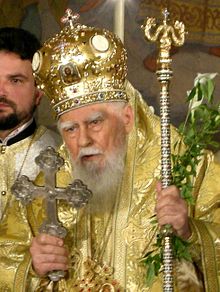Maxim (Patriarch)
Maxim ( Bulgarian Максим ) born Marin Minkov Najdenow (also Marin Naydenov Minkov written bulg Марин Найденов Минков;. * 29. October 1914 in Oreshak at Trojan , † 6. November 2012 in Sofia ) was a Bulgarian Orthodox theologian , monk priest , bishop , former Metropolitan of the Diocese of Lovetsch , Metropolitan of the Diocese of Sofia and Patriarch of the Bulgarian Orthodox Church (BOK for short).
Live and act
His spiritual career began when his parents sent the twelve-year-old to Trojan monastery in 1927 , where he lived for three years. From 1929 to 1935 he graduated from the Sofia Spiritual Academy with distinction. This was followed by work as a housekeeper and at the same time a choir member at the Church of the Assumption of Mary in Russe . From 1938 he studied Orthodox theology at the University of Sofia . In 1941 he took his religious vows and received the spiritual name "Maxim". In 1944 he was ordained a monk priest and in 1947 made an archimandrite . Maxim held the office of protosingel in the metropolitan area of Cherven and Dorostol for another three years . From 1950 to 1955 he represented the BOK at the Moscow Patriarchate . From 1955 to 1960, as secretary of the Holy Synod, he was also the editor-in-chief of the synodal publishing house.
In December 1956 he was ordained bishop in the Nevsky Cathedral with the title "Branitzki". Four years later he was elected Metropolitan of Lovech . During these years his intensive working contact with the Christian Peace Conference (CFK) began, in all of the six All-Christian Peace Conferences in Prague from 1960 to 1985 he was involved.
After the previous Patriarch Kiril died in 1971, he was elected Patriarch and Metropolitan of Sofia in July 1971 .
Maxim survived the change in the political system in his country in 1989, despite various attempts to refuse allegiance to him. A minority in the Holy Synod disobeyed him in 1992 and formed an “alternative synod” under the “ counter-patriarch Pimen ”, but returned to the Church in 2001. During the visit of Pope John Paul II in 2002, Maxim was keen to keep his church at a noticeable distance from the Vatican and demonstrated noticeable reluctance to take over Catholic efforts.
At a pan-orthodox council of all orthodox church leaders in September 2006 he was recognized as the leading patriarch of Bulgaria .
On November 6th at 3:30 in the morning Maxim died of heart failure in the Lozenez hospital in Sofia.
Web links
Individual evidence
- ↑ Patriarch of the Bulgarian Orthodox Church died at the age of 98. Maxim was at the top of the church for more than 40 years. Die Welt, November 6, 2012, accessed November 7, 2012 .
- ↑ Veselin Toshikov: Bulgarian Patriarch Maxim dies at age of 98. (No longer available online.) Myrtle Beach Online, November 6, 2012, formerly in the original ; accessed on November 7, 2012 (English). ( Page no longer available , search in web archives ) Info: The link was automatically marked as defective. Please check the link according to the instructions and then remove this notice.
- ↑ Marco Arndt: After the Stasi revelations - the Bulgarian Orthodox Church in state and society. Konrad-Adenauer-Stiftung eV, March 29, 2012, accessed on November 9, 2012 .
- ↑ Thomas Götz: Pope addresses the assassination attempt: Never believed in Bulgaria's participation. The unity of the church was re-invoked by John Paul II. Patriarch Maxim met him coolly. Die Presse, May 25, 2002, accessed November 7, 2012 .
- ↑ Patriarch Maxim died (Bulgarian), Dnevnik, accessed November 7, 2012
| predecessor | Office | successor |
|---|---|---|
| Kiril |
Patriarch of Bulgaria 1971–2012 |
Neofit |
| personal data | |
|---|---|
| SURNAME | Maxim |
| ALTERNATIVE NAMES | Marin Naydenov Minkov |
| BRIEF DESCRIPTION | Bulgarian clergyman, Patriarch of Sofia |
| DATE OF BIRTH | October 29, 1914 |
| PLACE OF BIRTH | Oreshak |
| DATE OF DEATH | November 6, 2012 |
| Place of death | Sofia |
